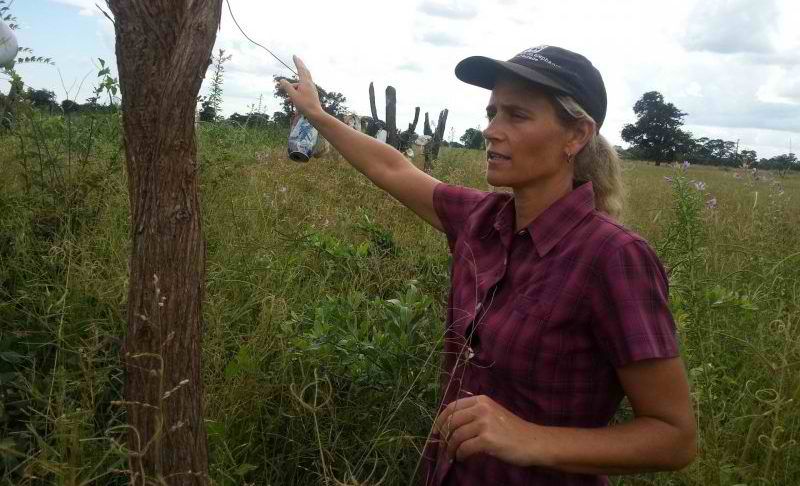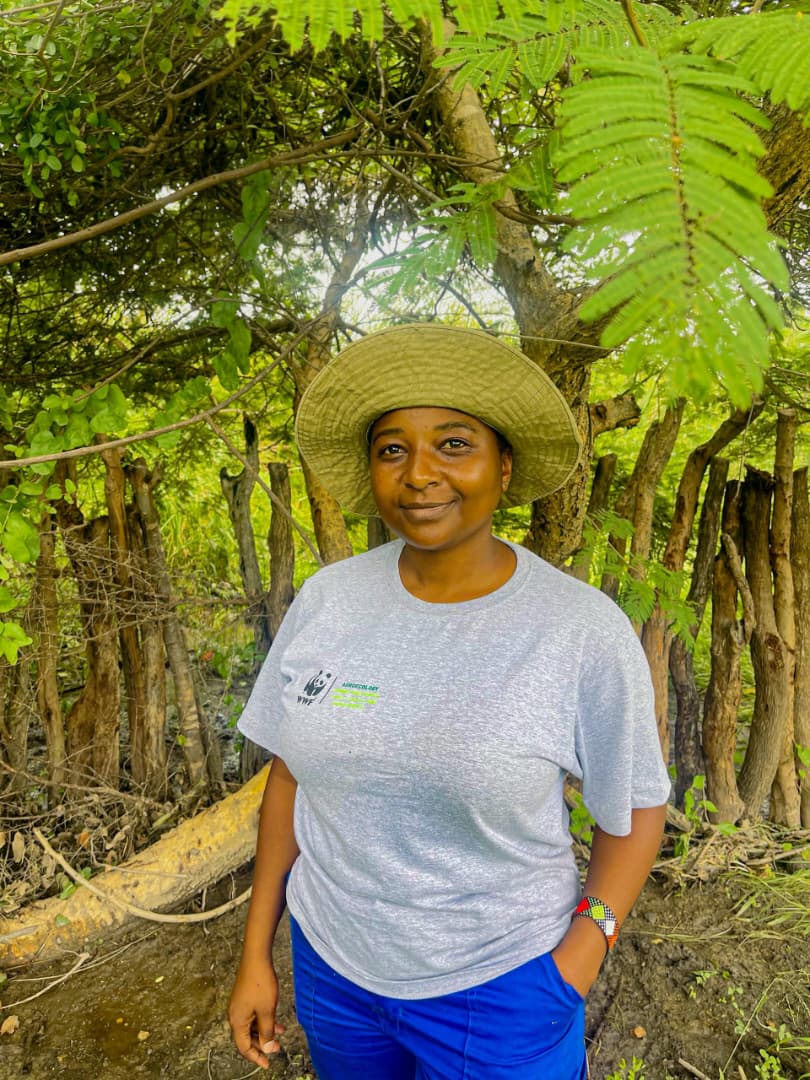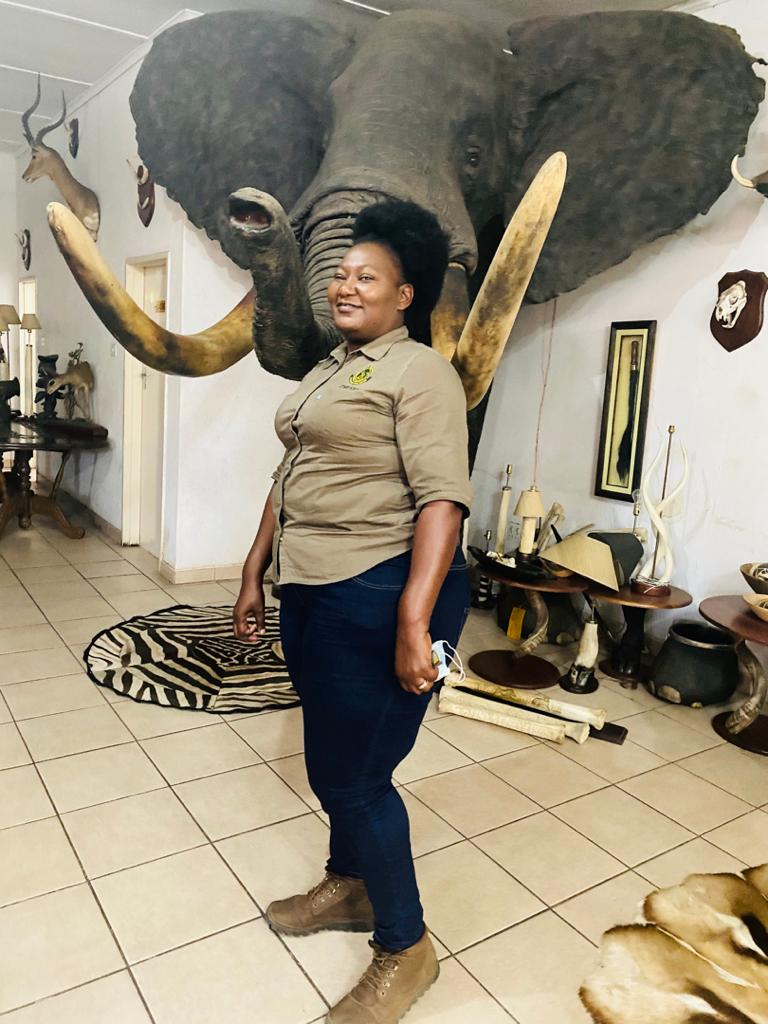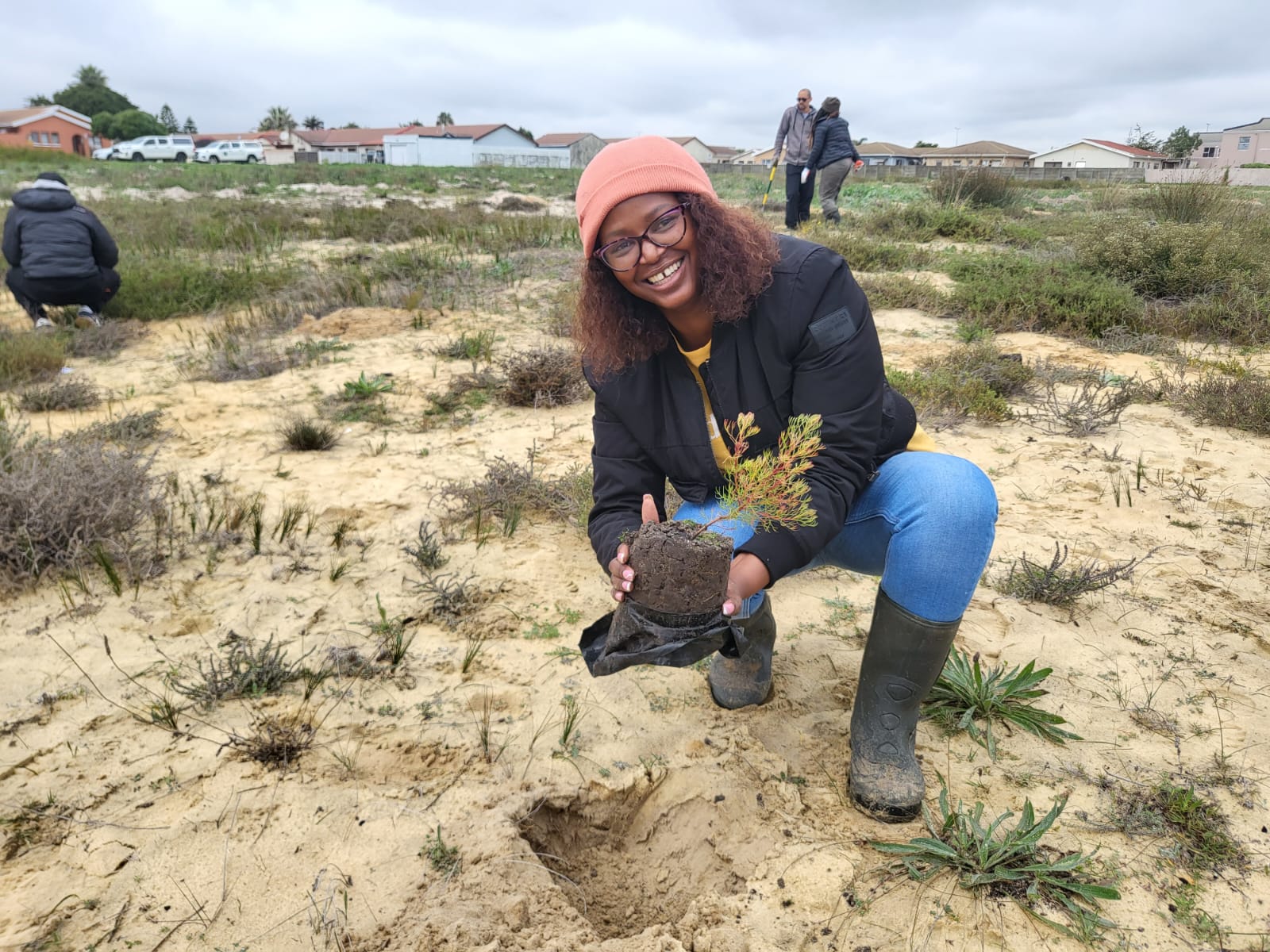Of course, we must stop the emissions urgently, but we've also got to help the people that are dealing with the consequences of those emissions.
Melissa de Kock is the Lead (Manager) of the Cross-cutting Conservation Team in WWF-Norway. From a young age, her passion was for nature and wildlife. But her career started in journalism.
After doing an undergrad, travelling and working overseas, and working in the media for a few years, she realised that journalism was not for her. At 28 years of age, she decided to act on her passion and start a master's in community and development with an environment link – this was when it all began to fall into place.
Melissa is now firmly planted in the world of environmental conservation, where she strives to rectify power imbalances and bring about social, environmental, and ecological justice.
She shares her story with Damaris Agweyu.

Melissa, what is your core value?
Justice. My whole life has been guided by my need to see social, ecological, and environmental justice. And for me, community conservation is one of the areas where that justice is possible. I strive to rectify power imbalances at all levels to bring about social justice (equity between people), environmental justice (equity in the costs and benefits of environmental and climate destruction), and ecological justice (that nature has the right to space).
Albert Einstein had this remarkable quote; he said:
"My passionate sense of social justice and social responsibility has always contrasted oddly with my pronounced lack of need for direct contact with other human beings and human communities…"
This quote resonates with me on a deep level because while I am not a particularly sociable person (though I have my moments), I care a great deal about justice and equity for others.
What drove you to adopt justice as a core value?
As a child, I saw that people were treated a certain way, not because of who they were at their core but because of where they were born or their skin colour. I felt this inequity in my country a lot and can only imagine that is what drove me.
In my working life, I see this inequity too – the people suffering the brunt of global environmental change are rarely the ones who caused it.
“The people suffering the brunt of global environmental change are rarely the ones who caused it”, can you break that statement down further?
In a very general way, the “global North”, which historically has caused the emissions which causes climate change, prioritise climate mitigation over adaptation, and this is evident in their aid funding and development policies. Yet the South, which historically caused few emissions, are the ones bearing the brunt of climate change and need support for adaptation. We've collectively caused this problem, but just because your priority is mitigation doesn't mean the people of Namibia should have the same priority. Here are people whose resources have been pillaged for so long, and that inequity continues to be perpetuated. Of course, we must stop the emissions urgently, but we've also got to help the people that are dealing with the consequences of those emissions.
Policies must be nature positive and climate neutral, but they must also be equitable because otherwise, you may end up with people being thrown off their land. You cannot do conservation in developing countries without social development.
Bridging the gap between the North and South is so critical to me. That's why I try so hard to get the voices of African communities into these bigger forums. The sessions where communities can speak, listen and interject and be heard, are, to me, more powerful than those where I or others are standing up at these conferences and speaking on their behalf.
A few years ago I facilitated a seminar between Norwegian and Namibian farmers. In Norway, there is a lot of conflict between farmers and wolves, though the wolf population is very small. I understand the challenge that needs to be addressed, and I brought some farmers from Namibia to talk about their experiences living with more than three times the number of lions, with no social security system! Nobody is going to give you food when a lion eats your cattle. And you still need to survive. That exchange where the Namibian farmers were sharing their experiences and lessons with Norwegian farmers was incredible. And that's the other thing. I struggle with people thinking that the North has all the answers.
What was your experience growing up as a white South African in the apartheid era?
My family is the result of colonialism, and I'm very aware of my positionality as a white African.
I grew up in a house with a left-wing/liberal mother and a journalist father. I found it incomprehensible that people could be "less" or "more" based on skin colour. I thought the judgements of people on others were so ignorant; for instance, when white people would ask why the people who worked for them couldn't read easily or speak English well when this was because of a lack of access to schooling, books, or electricity to learn, and not a sign of their intelligence.
I was lucky that many of the teachers in my school were "left-wing". We went on exchange visits to Mmbatho in Bophustwana, where we hung out with kids – black kids – who were "just the same as us". I know it sounds ludicrous but growing up where I did, we did not get any opportunities to meet many kids our age who were not white.
In 1991, we twinned with a school in the townships outside cape town, and I went with a teacher to pick them up one day; this was my first time in a township. I was 15, and the township was less than 25km away. I had often driven past it but never in it.
When Mandela was released, I was 15 and went to the grand parade with my mom to see him talk to the dancing and cheering crowd. It was so incredibly uplifting. But what's weird is that growing up under apartheid did not affect me as much as my awareness of my privilege has affected and influenced me in later life.
The fact that I was born white gave me a head start. Yes, I worked incredibly hard to get to university, but I also made it because I had electricity and food, my parents had access to credit, and I didn't have to work from the age of 6. I had a leg up.
Having had so many opportunities based very much on my skin colour, I try, as much as possible, to support others – mainly African women in conservation, but also men. I do this through mentorship and by facilitating their access to opportunities to be heard and seen and listened to.
Why do you think the term “white privilege” is so contentious among many white people?
I think the ones who struggle with it take it as an indication that they haven't worked hard. But no one is saying you didn’t work hard. That's not the point; the point is you didn't have to struggle as hard.
Have you ever been discriminated against as a white African woman?
Yes. I travelled to Europe when I was younger before apartheid had officially ended, and in a bar, in London, I was dancing with a black Brit, who asked me where I was from. I told him, South Africa. He just looked at me and then walked away. That was the first time I understood what it was like to be judged, not for who I was, but for who someone else thought I was and what I represented.
A few years later, again in London, another incident occurred when I was walking down Tottenham court road late one night talking to another black Brit. He told me Mandela would choose him over me because he was black and I was white.
These sorts of conversations have made me very cognizant of my position – a white South African, someone who believes they are African (I have no other passport), but not being considered African by others.
Also, as a woman in this sector, I am often not heard, seen, or listened to. In my early conservation career, I was told, by a white man, that I would never be respected by black men in this sector, which is why I wouldn't get a promotion. I have experienced the least respect from white men. Not all white men, though. Just some.
How did you end up in the world of conservation?
It was a long, convoluted journey to get here. But from a young age, I knew this was the space I wanted to be in.
I was lucky to be taken to Namibia a few times, and later Zimbabwe by my parents on "family holidays". Being in these wild places, seeing wildlife, hearing birds, but mostly seeing natural habitats was very influential – I felt utterly at home in nature.
I remember standing on a mountain in the arid northwest of Namibia, hearing no manmade sound, only the breeze in my ears, and just breathing it in deeply. I remember sitting on the van on the roof watching the sunset as we drove out of Vic falls town towards the park where we were overnighting. I remember standing on the bank of the Zambezi in mana pools in the dusk, knowing it was stupid but drawn away from the fires and other campers. My childhood memories of my interactions with nature are incredibly strong.
My mum also worked for Readers' Digest, so I was surrounded by books growing up – on nature, wildlife, Africa, and different cultures. I spent hours paging through them and later reading them.
At the start of my career, I fell into media work because my family worked in media. Nobody I knew worked in conservation. I believed I wanted to be a war journalist as a kid – like Christine Amanpour – which is what took me to Bosnia. It was during the Balkan war. I remember being horrified by what was happening, bearing in mind that the genocide in Rwanda was also happening. Still, it wasn't getting nearly the same amount of publicity, so I knew more about what was happening in ex-Yugoslavia than what was happening on my continent.
I went to Sarajevo to see what was happening and had these encounters with people who had survived the war; this flipped a switch for me about people. I wanted to somehow work with people who had experienced difficult things.
I came back home and started a master's degree part-time whilst working for a media company. I was planning a thesis on how to work with communities to stop abalone poaching. The administrator of the master's course said her husband was advertising for a coordinator, and seeing as I seemed to have an interest in conservation, maybe I should apply. I did, and I got the job. And it was through that job that I learned about community conservation in Namibia. I was blown away at what working with people, enabling them to manage and benefit from wildlife, could do for them and conservation, and I decided to do my thesis on that.
Community-based resource management became my spiritual home; that is the conservation that I promote. I know that people are part of the solution, not part of the problem. We need to find a way to empower people to live with nature again—the way they had been doing before all the plunder and pillage from the various colonial powers. I struggle a lot with the fines and fences approach.
Do you feel like your approach towards conservation is working?
It depends on what day it is. There are some days when I have so much hope, and other days I'm like the world is ending soon. When I look at the climate change stats and how people aren't paying attention to biodiversity loss and inequity, I think, how can people continue to behave like this? These are captains of industry with children and grandchildren, and they act like it doesn't matter what happens to the future.
We're not doing enough at the global level to stop it, but there are some remarkable opportunities at the local level.
Do you believe you are where you are meant to be?
Am I working in the right field? Without a doubt. Working in this field is not a choice for me. It is something I must do to live with myself with integrity and be happy, even when, at times, the weight of biodiversity loss, poverty and inequity, and climate change threaten to overwhelm me.
It's not an easy path that you’ve chosen.
No. The only way we have hope on this planet is if every single person changes their behaviour. I am not saying that individuals must bear the responsibility to fix a broken system – governments have to do that and make the polluting industry players change their behaviour. But each of us has a critical role to play.
It comes back to the people sitting in their comfortable homes, saying the communities mustn't encroach on the elephants' space. But one of the reasons the elephant doesn't have its habitat is because this person is living this high life in their comfortable home with their teak table. The reason the baboons are being shot is that this person is drinking wine from a farm in Cape Town that shoots baboons. These are the choices that are destroying habitat for the people and wildlife.
The system that enables the destruction of nature and our climate, and keeps people in poverty, has to be dismantled, and our choices are part of that.
At the very least, we all need to change their behaviour, if only for the sake of the next generation. I am hoping that the children of the next generation hold their parents responsible, learn from our mistakes and do better. But we need to make sure that we leave them with enough to work with. Because if they've got nothing left, they can't fix it.
***
This interview is part of a series profiling the stories of the 2021 WE Africa leadership programme fellows, African women in the environmental conservation sector who are showing up with a strong back, soft front, and wild heart.





